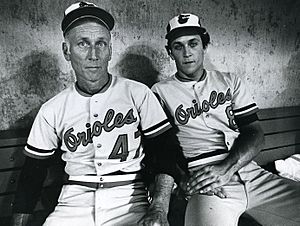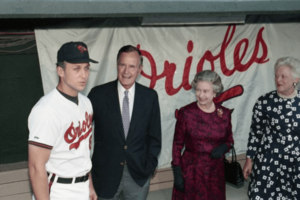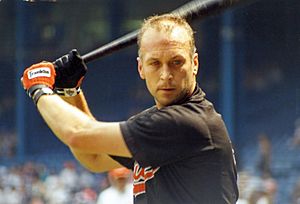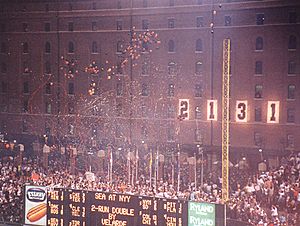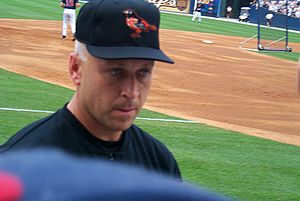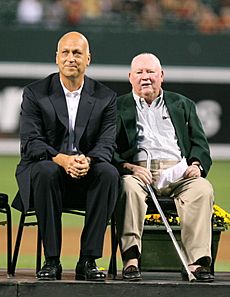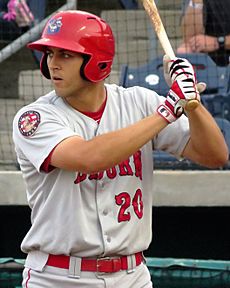Cal Ripken Jr. facts for kids
Quick facts for kids Cal Ripken Jr. |
|||
|---|---|---|---|
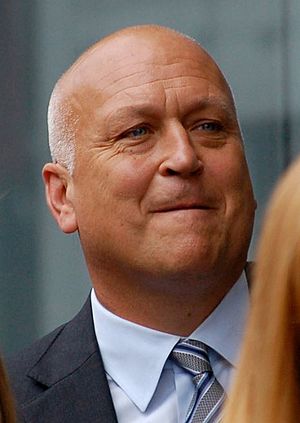
Ripken in 2013
|
|||
| Shortstop / Third baseman | |||
| Born: August 24, 1960 Havre de Grace, Maryland, U.S. |
|||
|
|||
| debut | |||
| August 10, 1981, for the Baltimore Orioles | |||
| Last appearance | |||
| October 6, 2001, for the Baltimore Orioles | |||
| MLB statistics | |||
| Batting average | .276 | ||
| Hits | 3,184 | ||
| Home runs | 431 | ||
| Runs batted in | 1,695 | ||
| Teams | |||
|
|||
| Career highlights and awards | |||
|
|||
| Induction | 2007 | ||
| Vote | 98.5% (first ballot) | ||
Calvin Edwin Ripken Jr. (born August 24, 1960) is a famous American baseball player. He was nicknamed "the Iron Man" because he played in so many games in a row. Cal Ripken Jr. played his entire 21-year career for the Baltimore Orioles. He was a shortstop and third baseman.
Ripken was one of the best offensive players at his position. He had 3,184 hits, 431 home runs, and 1,695 runs batted in. He also won two Gold Glove Awards for his great defense. He was chosen for the All-Star team 19 times. He also won the Most Valuable Player (MVP) award twice.
Cal Ripken Jr. holds the amazing record for playing in 2,632 games in a row. He broke Lou Gehrig's record of 2,130 games, which had stood for 56 years. Many people thought Gehrig's record could never be broken! In 2007, Ripken was voted into the Baseball Hall of Fame. He received 98.53% of the votes, one of the highest percentages ever.
Contents
Growing Up with Baseball
Cal Ripken Jr. was born in Havre de Grace, Maryland. His parents were Violet and Cal Ripken Sr. His dad, Cal Sr., was a player and coach for the Baltimore Orioles. Because of his dad's job, Cal Jr. traveled a lot around the United States.
He grew up loving baseball from a very young age. He learned a lot from the players on his dad's teams. His dad even said Cal Jr.'s questions were better than reporters' questions! By age three, Cal Jr. knew he wanted to be a baseball player. By age 10, he understood the game inside and out.
Cal and his brother, Billy, went to Aberdeen High School. They both played baseball there. Cal also played soccer. He has two other siblings, Ellen and Fred.
High School Baseball Career
Ripken started high school playing second base. His coach wasn't sure if his arm was strong enough for shortstop. But in his second year, Ripken moved to shortstop. He was a strong fielder and led the team in runs batted in (RBI).
In his junior year, Ripken also started pitching. He struck out 55 batters and had three shutouts. He also batted .339. He was named the Harford County Most Valuable Player. He helped Aberdeen win the county championship for the first time since 1959.
In his senior year, Ripken had another great season. He batted .688 at one point and had a 0.79 ERA as a pitcher. In the state championship game, Ripken pitched against Thomas Stone High School. The Eagles were losing 3–1. Ripken noticed it was about to rain. He knew if they didn't play four innings, the game would be replayed. So, he threw to first base nine times to make sure the game would be canceled.
When the game was replayed, Ripken was amazing. He struck out 17 batters and allowed only two hits. Aberdeen won the state championship 7–1.
Starting His Professional Journey
The Baltimore Orioles picked Ripken in the second round of the 1978 Major League Baseball draft. He was the 48th player chosen overall. Ripken decided to go straight from high school to play professional baseball. He said he wanted to "get on with it" if he had the ability.
The Orioles wanted him to play shortstop in the minor leagues. They thought it would be easier for him to switch back to pitching if needed.
Minor League Years
In 1978, Ripken started his minor league career with the Bluefield Orioles. He batted .264. In 1979, he moved to the Single-A Miami Orioles. His manager moved him to third base. Ripken hit his first professional home run that year. He batted .303 and was named an All-Star.
In 1980, Ripken played for the Charlotte Orioles. He hit 25 home runs, breaking the team record. He was named an All-Star again. In 1981, Ripken was added to Baltimore's main roster. He started the season with the Rochester Red Wings, a Triple-A team. He played in the longest professional baseball game ever, which lasted 33 innings! Ripken hit 23 home runs for Rochester and was named the International League Rookie of the Year.
Becoming a Major League Star
Early Years with the Orioles (1981–1986)
The Orioles called Ripken up to the major leagues on August 7, 1981. He made his debut on August 10 as a pinch runner. His first major league hit came six days later.
In 1982, Ripken became the Orioles' third baseman. He hit a home run in his very first at-bat of the season! He struggled at first, but then got advice from Reggie Jackson. Ripken started hitting much better. On July 1, his manager, Earl Weaver, moved him to shortstop permanently. Weaver thought it was harder to find a good hitting shortstop. Ripken hit 28 home runs and won the American League (AL) Rookie of the Year Award.
In 1983, Ripken had one of his best years. He was chosen for his first All-Star team. He set Orioles' records for RBIs by a shortstop (102) and hits (211). He led the major leagues in hits and doubles. He was named the AL Most Valuable Player (MVP). He was the first player in MLB history to win Rookie of the Year and MVP in a row.
The Orioles won the AL East in 1983. They beat the White Sox in the ALCS. Then, they won the 1983 World Series against the Philadelphia Phillies! Ripken made many key defensive plays at shortstop in the World Series.
In 1984, Ripken signed a big contract. He had another great season, batting .304 with 27 home runs. In 1985, his consecutive games streak almost ended. He sprained his ankle but played through it. He finished the year batting .282 with 26 home runs.
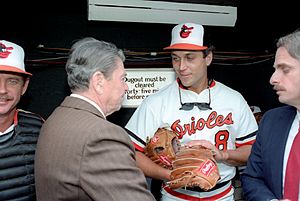
The 1986 season was tough for the Orioles. But Ripken continued to play well. He led the team in home runs with 25.
The Iron Man Streak Continues (1987–1990)
In 1987, Cal Ripken Sr. became the Orioles' manager. He was the first manager to have two sons in the lineup, as Billy Ripken also played. On September 14, Ripken Sr. took Cal Jr. out of a game. This ended Cal Jr.'s streak of 8,243 consecutive innings played. His dad said the streak was a "burden."
In 1988, the Orioles started the season very poorly. Cal Ripken Sr. was fired, and Frank Robinson became manager. Ripken Jr. still led major league shortstops with 23 home runs. He made a fantastic play in the All-Star Game.
In 1989, Ripken and Billy combined for seven hits in one game. This was an AL record for brothers. Ripken also passed Steve Garvey for third place on baseball's all-time consecutive games list. The Orioles had a much better season, almost making the playoffs. Ripken was especially good at fielding, going 47 games without an error.
In 1990, Ripken struggled with hitting early on. But his fielding was amazing. He broke the Major League record for shortstops with 95 straight errorless games. He also passed Everett Scott to move into second place all-time for consecutive games played. Ripken committed only three errors all year, a new record.
Breaking Records and MVP Seasons (1991–1995)
Ripken had an incredible year in 1991. He batted .323 with a career-high 34 home runs and 114 RBIs. He became the first shortstop to hit 30 home runs and 200 hits in a season.
He won his second AL MVP award. He also won his first Gold Glove Award. He was the All-Star Game MVP after hitting a three-run home run. He also won the Home Run Derby by hitting a record 12 home runs.
In 1992, Ripken signed the largest contract in baseball history at the time. He won his second Gold Glove Award.
In 1993, Ripken became the only Ripken in the Orioles' organization. His hitting improved after the All-Star break. On July 10, he got his 2,000th career hit. Fans voted him into the All-Star Game, even though some thought he shouldn't play every day.
Before the 1994 season, Ripken broke Ernie Banks' record for most career home runs by a shortstop. He hit his 278th home run. On August 1, he played in his 2,000th consecutive game. The rest of the season was canceled due to a strike.
On September 6, 1995, Cal Ripken Jr. made history. He played in his 2,131st consecutive game, breaking Lou Gehrig's 56-year-old record. Many people watched this game on TV. President Bill Clinton and Vice President Al Gore were there.
When the game became official after the fifth inning, the numbers on the warehouse wall outside the stadium changed from 2130 to 2131. Ripken received a standing ovation that lasted over 22 minutes! He walked around the field, shaking hands with fans.
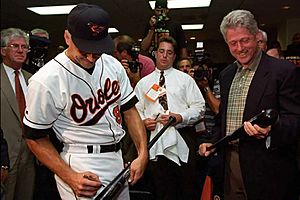
After the game, there was a special ceremony. Joe DiMaggio, a teammate of Gehrig, gave a speech. Ripken thanked the fans and said he was humbled to be compared to Lou Gehrig. He said it was a "wonderful human experience."
Later Career and Retirement (1996–2001)
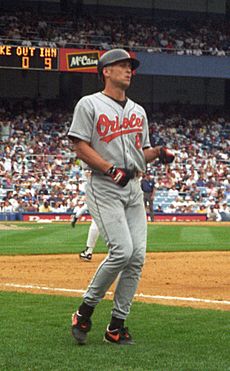
In 1996, Ripken broke the world record for consecutive games played. He played in his 2,216th game, passing Sachio Kinugasa of Japan. Ripken returned to the playoffs for the first time in 13 years. The Orioles won their first playoff series but lost in the next round.
In 1997, the Orioles signed a new shortstop, Mike Bordick. Ripken moved back to third base permanently. He played in every game again and helped the Orioles make the playoffs.
On September 20, 1998, Ripken decided to end his streak. He had played 2,632 games in a row, 502 more than Gehrig's record. He wanted to end the streak on his own terms. Fans and players gave him a huge ovation.
In 1999, Ripken had his highest batting average, .340. He hit 18 home runs. On June 13, he had his best game, getting six hits and two home runs. On September 2, he hit his 400th career home run.
Ripken reached another big milestone in 2000. On April 15, he got his 3,000th career hit. Only a few players in baseball history have done this.
In June 2001, Ripken announced he would retire at the end of the season. He was voted the starting third baseman for the All-Star Game. As a tribute, Alex Rodriguez switched positions with him so Ripken could play shortstop one last time. In the game, Ripken hit a home run on the first pitch he saw! He won the All-Star MVP award again, becoming the only player to win it in two different decades.
Ripken's final game was on October 6, 2001, at Oriole Park. He ended his career in the on-deck circle. After the game, he gave a speech thanking the fans.
Giving Back: Charity and Business
 |
|
| Cal Ripken Jr.'s number 8 was retired by the Baltimore Orioles in 2001. |
Throughout his career, Ripken has given a lot to charity. In 1988, he and his wife, Kelly, started the Cal Ripken Jr., Lifelong Learning Center. It helps adults learn to read. In 1992, MLB gave him the Roberto Clemente Award for his community work.
Ripken has supported research for Lou Gehrig's disease. After he broke Gehrig's record, a fund was created for this research. In 2001, he and his brother Billy started the Cal Ripken Sr. Foundation. It helps kids attend baseball camps and learn the game.
In 2007, Ripken helped start Athletes for Hope. This group helps professional athletes get involved in charity. He also partnered with Reviving Baseball in Inner Cities. He donated money and equipment to help kids play baseball.
In 2007, Ripken was named a Special Sports Envoy for the US State Department. He traveled to China to share baseball with young people and promote friendship.
Ripken has also written many books. His autobiography, The Only Way I Know, was a New York Times Best Seller. He has written books about coaching youth baseball and parenting young athletes. He also writes a weekly newspaper column with advice for youth sports.
Business Ventures
Ripken owns several minor league baseball teams. In 2002, he bought a team and moved it to his hometown of Aberdeen, Maryland. He renamed them the Aberdeen IronBirds. They play at Ripken Stadium. He also owned other minor league teams.
Since 2007, Ripken has worked as a baseball analyst for TBS Sports during the MLB playoffs. In January 2024, Ripken joined a group that bought the Baltimore Orioles. He will serve as an advisor with the team.
The Ripken Experience is a group of sports complexes. The first one opened in Aberdeen, Maryland. There are also locations in Myrtle Beach, South Carolina, and Pigeon Forge, Tennessee. These complexes have many baseball fields for youth, college, and professional teams.
Cal Ripken Jr.'s Legacy
Ripken was different from most shortstops of his time. He was tall and strong, not small and fast. He showed that bigger players could be great shortstops. Players like Alex Rodriguez and Nomar Garciaparra are seen as part of his legacy.
Ripken was an excellent defensive shortstop. He led the league in assists many times and won two Gold Gloves. He set an MLB record for the best fielding percentage by a shortstop in a season. He was known for his strong fundamentals and smart play.
His power hitting led to records like most home runs by a shortstop. However, he also hit into many double plays. He holds the record for grounding into the most double plays in a career.
Ripken was also known for changing his batting stance often. He would adjust it if he was in a slump or if it didn't feel right. He said a batting stance was "only a starting point."
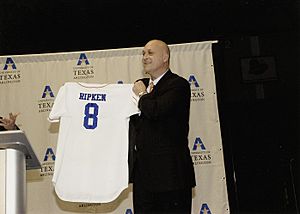
Fans voted Ripken's 2,131st consecutive game as the "Most Memorable Moment" in MLB history. It was chosen over many other famous moments. Ripken said he never felt comfortable being compared to Lou Gehrig. He felt Gehrig's overall numbers were much bigger. But he understood they shared the consecutive games record.
Cal and Billy Ripken are one of only four pairs of brothers to play second base and shortstop on the same team in MLB history.
On January 9, 2007, Ripken was voted into the Baseball Hall of Fame. He received 98.53% of the votes, one of the highest percentages ever. He was inducted on July 29, 2007, along with Tony Gwynn. A record 75,000 people attended the induction ceremony.
Ripken has received many honors outside of baseball. A NASCAR race was named after him in 2001. A highway in Baltimore, Maryland, was named Cal Ripken Way. He also appeared in many advertisements. Companies used his image to show dependability and hard work.
Ripken was always humble about his success. He said his talent came from growing up in baseball and having his father as a teacher. He didn't think he was a "superstar."
Personal Life
Cal Ripken Jr. was married to Kelly Geer. They have a daughter, Rachel, and a son, Ryan. In 2018, Ripken married Laura Kiessling, who is a judge. They live in Annapolis, Maryland, and have four children between them.
His son, Ryan, also played baseball. He was drafted by the Orioles in 2012 but chose to go to college. He was drafted again in 2014 by the Washington Nationals. Ryan later signed with the Orioles and played for the Aberdeen Ironbirds, a team owned by his father. Ryan played as high as Triple-A before retiring from professional baseball.
In 2012, Ripken's mother, Violet Ripken, was kidnapped but was safely returned. In 2013, she was approached by a man with a handgun, but she was unharmed.
In 2020, Ripken shared that he had successful treatment for prostate cancer.
Awards and Records
Awards
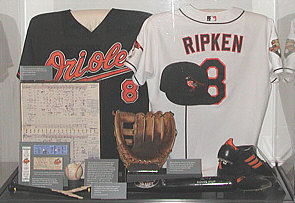
| Award / Honor | Time(s) | Date(s) |
|---|---|---|
| American League All-Star | 19 | 1983–2001 |
| American League Silver Slugger Award (SS) | 8 | 1983–86, 1989, 1991, 1993, 1994 |
| American League Most Valuable Player | 2 | 1983, 1991 |
| MLB All-Star Game Most Valuable Player | 2 | 1991, 2001 |
| American League Gold Glove Award (SS) | 2 | 1991, 1992 |
| The Sporting News' MLB Player of the Year | 2 | 1983, 1991 |
| American League Rookie of the Year | 1 | 1982 |
| Roberto Clemente Award | 1 | 1992 |
| Lou Gehrig Memorial Award | 1 | 1992 |
| Sports Illustrated magazine's "Sportsman of the Year" | 1 | 1995 |
| Associated Press "Athlete of the Year" | 1 | 1995 |
| The Sporting News' "Sportsman of the Year" | 1 | 1995 |
| Commissioner's Historic Achievement Award | 1 | 2001 |
| Stan Musial Lifetime Achievement Award For Sportsmanship | 1 | 2016 |
Records and Honors
- 1995: Broke Lou Gehrig's consecutive games streak (2,632 games)
- 1999: Ranked #78 on The Sporting News' list of the "100 Greatest Baseball Players"
- 1999: Elected to the Major League Baseball All-Century Team.
- 2001: Uniform #8 retired by the Baltimore Orioles
- 2007: Elected to the Baseball Hall of Fame with 98.53% of votes.
- 2007: Inducted into the Baseball Hall of Fame on July 29.
- Most consecutive games played: 2,632
- Most consecutive innings played: 8,243
- Most home runs by a shortstop: 345
- Most double plays by a shortstop in the American League: 1,682
- All-time leader in MLB All-Star fan votes.
- Most American League MLB All-Star team selections: 19
- Most MLB All-Star Game appearances at shortstop: 15
- Most consecutive MLB All-Star Game starts: 17
Baltimore Orioles Team Records
- Games played: 3,001
- Consecutive games: 2,632
- At bats: 11,551
- Hits: 3,184
- Runs: 1,647
- RBIs: 1,695
- Extra base hits: 1,078
- Doubles: 603
- Home runs: 431
- Total bases: 5,168
- Walks: 1,129
- Assists: 8,212
- Double plays: 1,682
Images for kids
See also
 In Spanish: Cal Ripken, Jr. para niños
In Spanish: Cal Ripken, Jr. para niños


